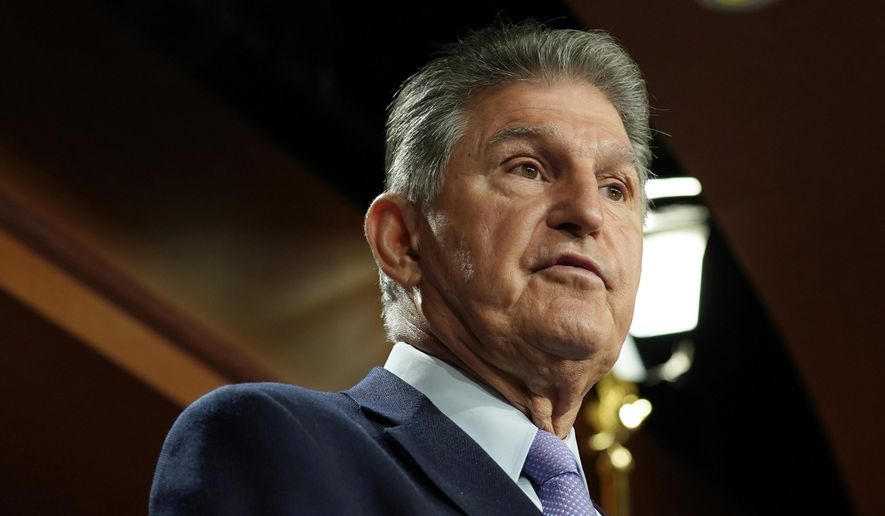Sen. Joe Manchin III retreated Tuesday under bipartisan opposition to his proposal to fast-track energy projects, pulling the plan from a stopgap spending bill in a move that cleared the way for Senate passage of the overall measure to keep the government open past Friday.
The move to strip Mr. Manchin’s provision from the must-pass spending bill allowed the conservative West Virginia Democrat to avoid an embarrassing legislative defeat with solid bipartisan resistance.
Such a public blunder, Mr. Manchin said, would make the U.S. look weak to adversaries such as Russian President Vladimir Putin.
“It is unfortunate that members of the United States Senate are allowing politics to put the energy security of our nation at risk,” Mr. Manchin said in a statement. “A failed vote on something as critical as comprehensive permitting reform only serves to embolden leaders like Putin who wish to see America fail.”
Senate Majority Leader Charles E. Schumer, New York Democrat, agreed to move forward with the procedural vote to advance the spending bill to fund the federal government through Dec. 16 without Mr. Manchin’s energy permitting proposal. Originally expected to fall short of the required 60 votes needed to advance, the funding measure easily cleared the procedural hurdle by a vote of 72-23. A final vote is expected Wednesday or Thursday.
Also included in the stopgap spending measure was more than $12 billion in military and humanitarian aid for Ukraine, billions of dollars for recovery from wildfires and other natural disasters, and $20 million to address the water sanitation crisis that has plagued Jackson, Mississippi.
The inclusion of Mr. Manchin’s unpopular energy provision was part of a deal he struck with Mr. Schumer and the White House in exchange for his crucial support of Democrats’ tax-and-climate-spending bill that passed in August.
Mr. Schumer blamed Republicans for nixing Mr. Manchin’s plan, although several Democrats were prepared to vote down the legislation.
“Senate Republicans have made very clear they will block legislation to fund the government if it includes bipartisan permitting reform because they’ve chosen to obstruct instead of work in a bipartisan way to achieve something they’ve long claimed they wanted to do,” Mr. Schumer said.
He promised to “continue to have conversations about the best way to ensure responsible permitting reform is passed before the end of the year.”
Although Republicans have long advocated energy permitting reform, they said the legislation did not go far enough to slash time-consuming environmental regulations and they were in no mood to help Mr. Manchin score another policy victory.
“This phony fig leaf is ‘permitting reform’ in name only,” said Senate Minority Leader Mitch McConnell, Kentucky Republican. “If tepid Democrat support for this phony fig leaf is all that our colleague from West Virginia got in return for approving yet another taxes and spending spree during an inflation crisis, it’s hard to imagine a worse bargain, for a senator or for the country.”
Climate hawks on the far left argued that the Manchin provision would boost fossil fuels and undercut their clean energy spending, despite arguments from supporters that it would offer much-needed help to accelerate the expansion of renewables.
Several Democratic senators who support permitting reform said they hope bipartisan debate will continue in the coming months, likely after midterm elections, when political tensions subside during a period known as a lame-duck session.
However, the issue is certain to cause Democrats continued heartburn amid fierce internal divisions. Those opposed to Mr. Manchin’s proposal are showing little signs of budging.
Sen. Bernard Sanders, a Vermont independent who caucuses with Democrats, celebrated the failure of Mr. Manchin’s endeavor.
“This is a good day for the climate and for the environment, and a bad day for Big Oil and the fossil fuel industry,” Mr. Sanders said. “Do I think it’s good policy that two people sit alone behind closed doors to make these important decisions? No, I don’t.”
Sen. Shelley Moore Capito of West Virginia was the lone Republican who said publicly that she planned to vote for Mr. Manchin’s plan, despite Republican senators rallying around her own rival proposal. She suggested that there is a path forward for a bipartisan permitting bill — if Democrats include Republicans in negotiations — in a measure such as the annual National Defense Authorization Act, which funds the Defense Department.
“That was a one-party bill. That’s why I put my ideas out,” Mrs. Capito said. “I think we can work together on this.”
• Ramsey Touchberry can be reached at rtouchberry@washingtontimes.com.




Please read our comment policy before commenting.